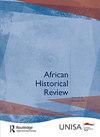Narratives in Anecdotes, Memory and Interlocutors: An Early Engagement with Neville Alexander’s Story
IF 0.1
Q3 HISTORY
引用次数: 0
Abstract
ABSTRACT In this article, I present a story about South African Marxist and activist-scholar Neville Edward Alexander. As historians, social scientists and intellectuals embedded in the humanities, a part of the job we have awarded ourselves or that we assume to be part of our disciplinary reasoning, our intellectual orbit, is to bring to life the periods that, and the people about whom, we reflect. This we do through writing and telling stories, often constructed with a “moral message” of sorts. In these acts of writing and story-telling, objectivity plays a disputed and a precarious role, and misrepresentations could be conscious or unwitting. The lack of objectivity in bringing to life the period and the people we talk about in our stories, in our exaggeration and our understatement about what we have read, about what we have heard, and then about what we write, is part of an academic’s narrative. These human traits of exaggeration and understatement can lead to historical error. In this early exploration of seeking answers to the questions, “Who is Neville Alexander?” and “What can we learn from his writings?” I offer two anecdotes about the man. My proposition is that overcoming historical error does not rest exclusively with factual verification. It has to factor in an appraisal of the ideological intention or even political wish of the people telling the stories, in written texts and orally, and of the interlocutors’ context that we recover in our historical studies. In writing this preliminary sketch of Alexander, I take a detour into higher education issues, particularly the field of doctoral studies, and I paraphrase some of the concerns that have been raised by Alexander. I conclude this introductory study with some thoughts on Alexander’s contributions to social change, to “race,” and to language policy and multilingualism.轶事、记忆和对话者中的叙事:内维尔·亚历山大故事的早期研究
摘要在这篇文章中,我介绍了一个关于南非马克思主义者和活动家学者内维尔·爱德华·亚历山大的故事。作为历史学家、社会科学家和植根于人文学科的知识分子,我们授予自己的工作的一部分,或者我们认为是我们学科推理的一部分、我们的知识轨道的一部分是将我们所反思的时代和人带到生活中。我们通过写作和讲述故事来做到这一点,这些故事通常带有某种“道德信息”。在这些写作和讲故事的行为中,客观性扮演着一个有争议和不稳定的角色,虚假陈述可能是有意识的,也可能是无意的。缺乏客观性,无法将我们在故事中谈论的时代和人物栩栩如生,我们对所读内容、所听内容以及所写内容的夸大和轻描淡写,是学者叙事的一部分。这些夸张和轻描淡写的人类特征可能会导致历史错误。在早期探索“谁是内维尔·亚历山大?”和“我们能从他的作品中学到什么?”这两个问题的过程中,我提供了两个关于这个人的轶事。我的主张是,克服历史错误并不完全取决于事实的验证。它必须考虑到对在书面文本和口头中讲述故事的人的意识形态意图甚至政治愿望的评估,以及我们在历史研究中恢复的对话者的背景的评估。在写这篇亚历山大的初步草图时,我绕过了高等教育问题,特别是博士研究领域,并转述了亚历山大提出的一些担忧。在结束这项介绍性研究时,我对亚历山大对社会变革、“种族”、语言政策和多语制的贡献进行了一些思考。
本文章由计算机程序翻译,如有差异,请以英文原文为准。
求助全文
约1分钟内获得全文
求助全文

 求助内容:
求助内容: 应助结果提醒方式:
应助结果提醒方式:


